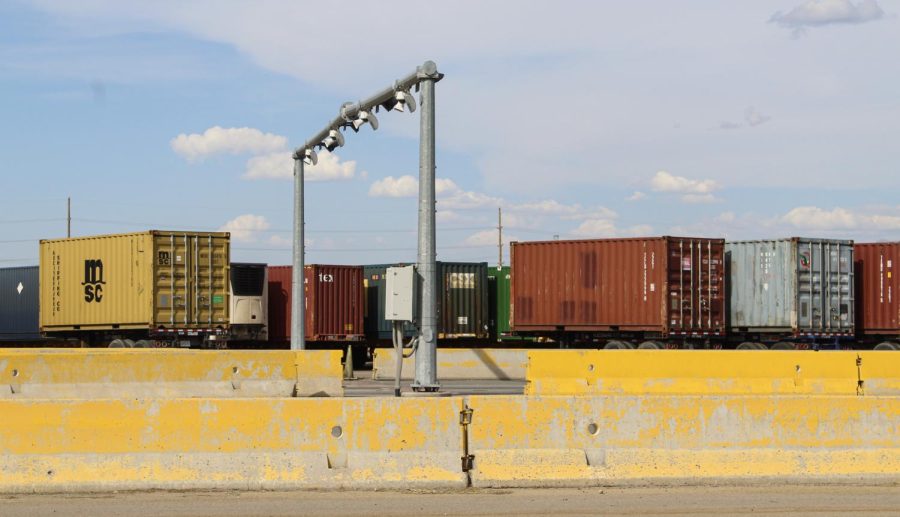Saifee: The Inland Port Started with the U, and Should End with You
(Photo by Brooklyn Critchley | The Daily Utah Chronicle)
October 29, 2021
The University of Utah sits at the base of the foothills and peers down into the valley. Oftentimes, the U feels like a bubble, disconnected from the rest of Salt Lake City. But the happenings in Salt Lake City affect us, whether we realize it or not. As students, we should regularly voice our concerns because of our connection to this larger community. One issue that needs our attention, voice and vehement critique is the proposed construction of the Utah Inland Port.
As it stands, the port is slated for construction in Salt Lake City’s northwest quadrant, and with it will come severe health and environmental consequences. It directly impacts the communities where students live, work and learn. Increased air, light and sound pollution are in our near future if we don’t object to this project. We should collectively oppose the port’s construction for everyone’s wellbeing.
For the past 40 years, Salt Lake City has entertained the idea of an inland port, a distribution hub for cargo that will increase truck, rail and general transportation in Utah. The U’s Kem C. Gardner Institute has unfortunately played a part in making this idea a terrifying reality.
The Gardner Institute released a “Salt Lake Inland Port Market Assessment” in 2016, which concluded that Salt Lake City meets the foundational perquisites for an inland port, warranting further research, analysis and investment. This spurred former Gov. Hebert to create an inland port exploratory committee. And in 2018, the legislature approved the Utah Inland Port and its governing body, the Utah Inland Port Authority.
Deeda Seed, a key organizer for the Stop the Polluting Port Community Coalition, said in an interview that port project has lacked “transparency and accountability” from the beginning. The bill that approved the port and governing body was heard on the Senate floor for only 15 minutes, with little debate. Seed has spent most of her life in public policy and she said “[the Utah Inland Port] is the worst process I’ve seen in my entire life.”
The port authority used to hold its meetings in private until public outcry forced them to hold open meetings. Now their meetings are accessible, but it is a smokescreen of empty promises and blank pages. The authority’s website states sustainability is essential to the construction of the port, but Seed warns that this is greenwashing.
The port’s proposed construction site is on ecologically critical, marshy wetlands nearby the Great Salt Lake. Experts have expressed concerns that the thousands of migratory bird species that rely on the Great Salt Lake will be negatively affected. Construction on this fragile will not only impact animal species but will also adversely affect humans.
For starters, the port will almost certainly cause more pollution. Salt Lake City has enough pollution — we had the worst air quality in the world in August 2021. Doctors have determined that breathing in poor air has long-term health consequences for a person’s mental and physical wellbeing. We cannot afford to build new pollution sources, let alone on the westside which faces disproportionate effects of poor air.
Air pollution isn’t the only pollution source we should worry about. Westside communities such as Rose Park, Fair Park, Poplar Grove and Glendale will face more light and sound pollution. Like air pollution, increased light and sound pollution can harm a person’s wellbeing.
Our westside communities, which are the most ethnically diverse and lower-income, will face the brunt of the negative impacts. Seed said, “There is an environmental injustice happening — the west side of Salt Lake City will be burdened with traffic congestion, pollution and all the disruption that comes from industrial development and they tend to have fewer resources to fight back.”
As students, we can fight back. We have the unique ability to organize quickly and effectively. Student testimonies have encouraged Seed in the past. She said, “It’s surprising for the Port Authority to hear the voices of young people.” She went on to say that young people are essential to this fight because they have the most to lose with this port’s construction.
We must continue using our voice in the Port Authority board meetings. We need to keep the pressure on our local and state officials. And with the upcoming legislative session, we should count on more sly behavior from the Inland Port Authority. Showing them that our voices matter will show just how much this issue matters to the whole community.









